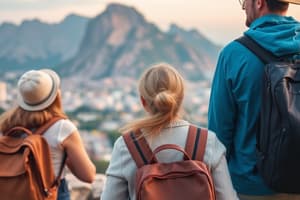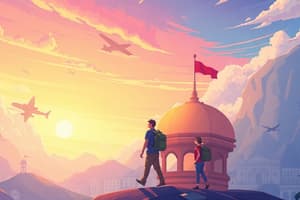Podcast
Questions and Answers
Tourism is a critical sector of the global _______________, driving growth and development in various countries.
Tourism is a critical sector of the global _______________, driving growth and development in various countries.
economy
Understanding travel behavior is crucial for developing effective tourism _______________ and strategies.
Understanding travel behavior is crucial for developing effective tourism _______________ and strategies.
policies
Travel behavior can be analyzed at different stages of the tourism process: pre-visit, on-site, and _______________.
Travel behavior can be analyzed at different stages of the tourism process: pre-visit, on-site, and _______________.
post-visit
Pre-visit factors include decision-making, values, motivations, self-concept, and _______________.
Pre-visit factors include decision-making, values, motivations, self-concept, and _______________.
On-site factors include expectations, attitudes, perceptions, _______________, and trust.
On-site factors include expectations, attitudes, perceptions, _______________, and trust.
A traveler's motivation to visit a historical site may be influenced by their self-concept as a _______________ buff.
A traveler's motivation to visit a historical site may be influenced by their self-concept as a _______________ buff.
Post-visit factors include loyalty, word-of-mouth, and repeat ______.
Post-visit factors include loyalty, word-of-mouth, and repeat ______.
Consumer behavior in tourism is influenced by various factors, such as ______, generational trends, and ethical consumption.
Consumer behavior in tourism is influenced by various factors, such as ______, generational trends, and ethical consumption.
Generation Y tourists, also known as ______, often prioritize experiences over material possessions.
Generation Y tourists, also known as ______, often prioritize experiences over material possessions.
Understanding ______ behavior is essential for the development of effective tourism policies and strategies.
Understanding ______ behavior is essential for the development of effective tourism policies and strategies.
Ethical consumption has become increasingly important to tourists, with many now seeking destinations and ______ experiences that align with their personal values.
Ethical consumption has become increasingly important to tourists, with many now seeking destinations and ______ experiences that align with their personal values.
By analyzing the factors that influence ______ behavior at each stage of the tourism process, policymakers and industry professionals can make informed decisions.
By analyzing the factors that influence ______ behavior at each stage of the tourism process, policymakers and industry professionals can make informed decisions.
Flashcards are hidden until you start studying
Study Notes
Tourism is a critical sector of the global economy, driving growth and development in various countries. One of the essential aspects of tourism is travel behavior, which encompasses the actions and decision-making processes of individuals who engage in travel activities. Understanding travel behavior is crucial for developing effective tourism policies and strategies, as it provides insight into the motivations, preferences, and patterns of tourists.
Travel behavior can be analyzed at different stages of the tourism process: pre-visit, on-site, and post-visit. Each stage involves unique factors that influence the overall travel experience and the potential for repeat visits.
Pre-visit factors include decision-making, values, motivations, self-concept, and personality. These factors shape the initial choice of destination, travel mode, and budget. For instance, a traveler's motivation to visit a historical site may be influenced by their self-concept as a history buff. Additionally, their personality traits, such as adventurousness, may impact their choice of travel mode, such as hiking or using public transportation.
On-site factors include expectations, attitudes, perceptions, satisfaction, and trust. These factors influence the overall quality of the travel experience. For example, if a traveler has high expectations for a hotel, but their actual experience does not meet those expectations, their satisfaction and trust in the hotel will be affected.
Post-visit factors include loyalty, word-of-mouth, and repeat visitation. These factors are critical for understanding the long-term impact of a travel experience on a tourist's behavior. For example, if a traveler has a positive experience at a particular destination, they may become loyal customers and recommend the destination to others, leading to increased tourism in that area.
Consumer behavior in tourism is influenced by various factors, such as technology, generational trends, and ethical consumption. For example, the rise of social media platforms has changed the way tourists research and share information about destinations. Generation Y tourists, also known as Millennials, often prioritize experiences over material possessions and are more likely to engage in sustainable tourism practices. Additionally, ethical consumption has become increasingly important to tourists, with many now seeking destinations and travel experiences that align with their personal values.
In conclusion, understanding travel behavior is essential for the development of effective tourism policies and strategies. By analyzing the factors that influence travel behavior at each stage of the tourism process, policymakers and industry professionals can make informed decisions that enhance the overall travel experience and promote sustainable tourism practices.
Studying That Suits You
Use AI to generate personalized quizzes and flashcards to suit your learning preferences.




